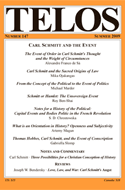The aftermath of the War on Terror rages on despite bipartisan assurances that “major combat operations are over” and that “the war is coming to a close.” This ongoing conflict has produced, and continues to produce, prodigious human casualties and economic hemorrhaging. Tim Luke’s words regarding September 11, 2001, are in many ways as timely today as they were nearly fourteen years ago.
|
On The Agenda with Steve Paikin, Michael Millerman discusses the philosophy of Alexander Dugin and its influence on Vladimir Putin and contemporary Russian geopolitics. It’s a wide-ranging interview that covers Dugin’s theory of Eurasianism, his critique of the West and liberal democracy, the defense of Russia as a unique, non-Western civilization in its own right, the compatibility of Dugin’s anti-communism with the view that the collapse of the Soviet Union was a geopolitical catastrophe, the difference between Western multiculturalism and the kind of multicivilizational diversity that Dugin advocates, and much more. Watch the full interview below. In addition to co-translating Dugin’s The Fourth Political Theory (Arktos, 2012), Michael is also a former Telos intern. You can read more of his writing in the TELOSscope archives. |
||||
|
Telos Press Publishing · PO Box 811 · Candor, NY 13743 · Phone: 212-228-6479 Privacy Policy · Data Protection Copyright © 2024 Telos Press Publishing · All Rights Reserved |
||||
 Central to Carl Schmitt’s geophilosophy is his view that law is intrinsically linked to the physical location. This connection between the terra firma and the law is an essential element of what he refers to as nomos. Schmitt sees this as the most authentic form of law, distinguishable from views that perceive law as a normative or positive regime. In his article “Carl Schmitt and the Sacred Origins of Law,” Mika Ojakangas elucidates Schmitt’s conception of nomos, its relation to Schmitt’s view of mythopolitical legitimization of the state, and the consequences of rejecting the notion of such a link by secularization.
Central to Carl Schmitt’s geophilosophy is his view that law is intrinsically linked to the physical location. This connection between the terra firma and the law is an essential element of what he refers to as nomos. Schmitt sees this as the most authentic form of law, distinguishable from views that perceive law as a normative or positive regime. In his article “Carl Schmitt and the Sacred Origins of Law,” Mika Ojakangas elucidates Schmitt’s conception of nomos, its relation to Schmitt’s view of mythopolitical legitimization of the state, and the consequences of rejecting the notion of such a link by secularization. 






